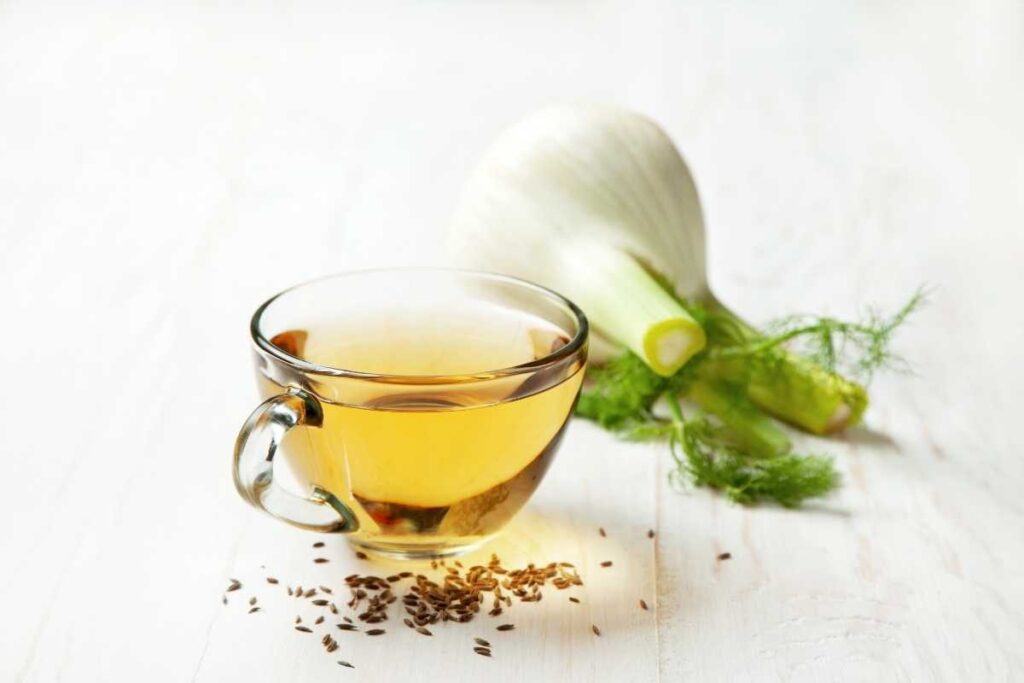Fennel Tea: Unveiling 16 Surprising Health Benefits

Looking for a natural way to improve your digestion and boost your overall health? Look no further than fennel tea! Made from the seeds of the fennel plant, this herbal tea is packed with powerful properties that can help you feel better in no time. Drinking fennel tea regularly can help relieve digestive issues like bloating and constipation, thanks to its ability to improve digestion. Not only that, but fennel tea also has anti-inflammatory properties that can reduce inflammation throughout your body, as well as antioxidants that protect against free radicals and oxidative stress. With potential antibacterial benefits as well, it’s clear that fennel tea is a must-try for anyone looking to improve their health naturally. Fennel is also used in traditional medicine for its essential oils that aid in digestion and reduce acid reflux. Incorporating fennel into your food or drinking fennel tea can provide these benefits and more. So what are you waiting for? Start drinking fennel tea today and experience the many benefits it has to offer!
Nutrition and Side Effects of Drinking Fennel Tea
Fennel tea is a popular herbal beverage in traditional medicine and natural medicine that has been consumed for centuries due to its potential health benefits. However, it’s important to note that drinking fennel tea may also have some side effects. Fennel is also used as a food ingredient and in essential oils.
Potential Side Effects
While fennel tea is generally safe to drink as a natural medicine, some people may experience symptoms after consuming too much of this food. One common symptom of drinking excessive fennel tea is nausea or vomiting, which can be caused by the high concentration of volatile oils in the plant. Additionally, fennel tea may aggravate acid reflux symptoms in some individuals.
Another possible symptom of excessive fennel tea consumption is diarrhea. This can occur if you consume too much fiber from the herb, which can cause your digestive system to become overloaded. Fennel tea is a natural medicine that is known for its weight loss benefits, but it is important to consume it in moderation to avoid any unwanted side effects.
It’s also worth noting that fennel tea, an herb, may interact with certain medications. If you’re experiencing symptoms and taking any medication, it’s important to talk to your doctor before consuming fennel tea. A study has shown that some people may experience adverse effects when consuming fennel tea with their medication.
Diuretic Effect
One potential benefit of drinking fennel tea, an herb known for its anise-like flavor, is its mild diuretic effect. According to a study, it can help flush excess water from your body and reduce bloating and water retention. Additionally, some people believe that fennel tea may also have benefits for eye health.
This herb’s diuretic effect is due to the presence of compounds called anethole and estragole in fennel seeds, according to a study. These compounds increase urine production in the body, which helps eliminate excess fluids. Additionally, fennel seeds may also benefit eye health.
Antioxidants and Anti-inflammatory Properties
Fennel seeds have been the subject of several studies, which have found that they are a good source of antioxidants such as flavonoids and phenolic compounds. These antioxidants help protect your cells from damage caused by free radicals, which can contribute to chronic diseases like cancer and heart disease.
Some studies suggest that fennel seeds may have anti-inflammatory properties. These study findings could potentially help reduce inflammation in the body, which is linked to many chronic diseases.
Risks and Side Effects of Fennel Tea
Fennel tea has been used for centuries for its medicinal properties, but it’s important to be aware of the potential risks and side effects before consuming it. A study on fennel tea consumption can provide more insights into its benefits and drawbacks. Here are some things you should know:
Allergic Reactions
Fennel is a member of the carrot family, and some individuals may be allergic to it. If you experience symptoms such as hives, itching, or difficulty breathing after drinking fennel tea, stop using it immediately and seek medical attention. There is currently no study on the prevalence of fennel allergies, so it’s important to be cautious if you have never consumed it before.
Digestive Issues
While fennel tea is often used to aid digestion, a study showed that consuming excessive amounts can actually lead to digestive issues such as bloating, gas, and diarrhea. It’s important to follow recommended dosages and not overdo it.
Medication Interactions
Fennel tea may interact with certain medications, according to a study. For example, it can increase the effects of blood-thinning drugs such as warfarin. If you’re taking any medications, talk to your doctor before using fennel tea.
Pregnancy
Fennel tea should be avoided by pregnant women as it may stimulate uterine contractions and cause miscarriage. There isn’t enough information about its safety during this time, despite the need for a study. It’s also not recommended for breastfeeding mothers.
How to Make Fennel Tea: Recipe and Instructions
Fennel tea is a delicious and easy-to-make beverage that has been enjoyed for centuries. This tea is made by steeping fennel seeds in hot water, creating a refreshing drink with a variety of potential health benefits.
Ingredients
To make fennel tea, you will need:
- 1 teaspoon of fennel seeds per cup of water
- Water
- Optional: honey or lemon for flavor
Instructions
- Boil water in a kettle or on the stove.
- Measure out one teaspoon of fennel seeds et al per cup of water.
- Place the fennel seeds et al into a strainer or tea infuser.
- Pour boiling water over the fennel seeds and let them steep for 5-10 minutes.
- Remove the strainer or infuser from the hot water.
- Add honey or lemon if desired for flavor.
- Enjoy your homemade fennel tea!
About Fennel Seeds
Fennel seeds come from the fennel plant, scientifically known as Foeniculum vulgare Mill. This plant is native to southern Europe but can now be found throughout the world.
The seeds have a distinct licorice-like flavor and are commonly used in cooking and baking. They are also used to make herbal teas like fennel tea due to their potential health benefits.
Potential Health Benefits
Fennel tea has been traditionally used as a natural remedy for various ailments such as digestive issues, respiratory problems, and menstrual cramps.
Some studies suggest that drinking fennel tea may help alleviate bloating, gas, and constipation due to its anti-spasmodic properties. It may also have anti-inflammatory effects that could help reduce inflammation in the body.
While more research is needed to fully understand its potential health benefits, incorporating fennel tea into your diet is a simple and tasty way to potentially improve your overall health.
Promoting Digestion and Gut Health with Fennel Tea
Drinking fennel tea is a natural way to promote digestion and gut health. This product contains ingredients that can help alleviate digestive issues such as gas, bloating, and spasms in the gastrointestinal tract. In this article, we will discuss how fennel tea can help improve your digestive system and overall health.
Benefits of Drinking Fennel Tea for Digestion
Fennel tea has been used for centuries as a natural remedy for various digestive issues. The following are some benefits of drinking fennel tea:
- Alleviates Gas: Fennel tea is known to reduce gas in the gastrointestinal tract that causes bloating, discomfort, and flatulence.
- Relieves Spasms: Fennel tea contains anethole, which is an active ingredient that helps relax the muscles in the intestinal walls and relieve spasms.
- Manages IBS Symptoms: Drinking fennel tea regularly can help manage symptoms of irritable bowel syndrome (IBS) such as constipation, diarrhea, abdominal pain, and bloating.
- Helps with Colic: Fennel tea et al can be given to babies suffering from colic to soothe their stomachs.
- Natural Remedy for Acid Reflux: Fennel tea can help reduce acid reflux symptoms by reducing inflammation in the esophagus.
Incorporating Fennel Tea into Your Diet
Fennel tea is easy to incorporate into your diet. You can drink it hot or cold throughout the day after meals or when you experience any digestive discomfort. It’s important to note that consuming too much fennel may lead to adverse effects such as nausea or vomiting.
Other Health Benefits of Fennel Tea
Aside from promoting digestion and gut health, drinking fennel tea also provides other health benefits due to its content of nutrients and compounds from the carrot family. These include:
- Improves Breath: Fennel tea has antimicrobial properties that can help freshen breath and prevent bad odor.
- Promotes Heart Health: Fennel tea contains potassium, which is essential for regulating blood pressure and promoting heart health.
- Provides Relief for Painful Periods: Fennel tea has antispasmodic properties that can help relieve menstrual cramps.
Why is Fennel Tea High FODMAP?
Fennel tea is considered high in FODMAPs (fermentable oligosaccharides, disaccharides, monosaccharides, and polyols), which are short-chain carbohydrates that some people have difficulty digesting. Therefore, individuals with irritable bowel syndrome or other digestive disorders may want to limit their intake of fennel tea.
Fighting Infections and Boosting Immune System with Fennel Tea
Looking for a natural remedy to fight infections and boost your immune system? Look no further than fennel tea! This herbal tea has been used for centuries in traditional medicine due to its antibacterial properties, which can help ward off harmful pathogens.
The essential oils found in fennel tea have been shown to be particularly effective against fungal infections. These oils contain compounds that can inhibit the growth of fungi, making them a great choice for those suffering from conditions like athlete’s foot or ringworm.
But that’s not all – fennel tea also has anti-inflammatory properties that can help reduce inflammation throughout the body. This is especially important as inflammation can actually make it harder for your immune system to do its job. By reducing inflammation, you’re giving your body a better chance of fighting off harmful invaders.
In addition to its antibacterial and anti-inflammatory properties, fennel tea also contains bioactive compounds that have been linked to potential cancer-fighting properties. While more research is needed in this area, early studies suggest that these compounds may be able to help prevent the growth and spread of cancer cells.
If you’re looking for even more reasons to add fennel tea to your daily routine, consider this: drinking a cup of fennel tea each day may benefit those with diabetes by helping regulate blood sugar levels and supporting liver function. This is because the plant contains vitamins and other nutrients that are important for maintaining healthy blood sugar levels.
So what do you need to get started? All you need is some dried fennel seeds and hot water! Simply steep the seeds in boiling water for about 10 minutes, strain out the seeds, and enjoy. You can also add honey or lemon juice if you prefer a sweeter taste.
Improving Sleep Quality and Appetite with Fennel Tea
If you’re looking for a natural way to improve your sleep quality and appetite, fennel tea might be just what you need. This caffeine-free tea is rich in nutrients that can help alleviate discomfort and painful menstrual cramps, making it an excellent choice for women.
Rich in Nutrients for Appetite and Weight Loss
Fennel tea is rich in vitamins and minerals that can help improve your appetite and aid in weight loss. It contains vitamin C, potassium, magnesium, calcium, and iron, which are all essential nutrients that your body needs to function properly.
In addition to these essential nutrients, fennel tea also contains fiber. Fiber is important because it helps keep you feeling full longer after eating. When you feel full, you’ll be less likely to snack on unhealthy foods throughout the day.
Alleviates Discomfort and Painful Menstrual Cramps
Many women experience uncomfortable feelings during their menstrual cycle. However, studies have shown that fennel tea can help alleviate discomfort and painful menstrual cramps.
Fennel tea has been used as a natural remedy for menstrual pain for centuries. Its anti-inflammatory properties work by reducing inflammation in the body that can lead to pain during menstruation.
Caffeine-Free Option for Improved Sleep Quality
If you’re struggling with getting enough restful sleep at night due to caffeine intake from other beverages like coffee or soda, consider switching to fennel tea. Fennel tea is caffeine-free which makes it an excellent option if you want to improve your sleep quality.
Drinking fennel tea before bed can help relax your muscles and calm your mind so that you fall asleep faster. The sedative properties of this herbal drink make it an excellent choice if you suffer from insomnia or other sleep disorders.
What Does It Taste Like?
Fennel tea has a slightly sweet and licorice-like taste that is refreshing and soothing. If you’re not a fan of the taste, you can add honey or lemon to your tea to make it more palatable.
Conclusion: Drink Fennel Tea for its Health Benefits
Drinking fennel tea can be a great addition to your daily routine. Despite some minor side effects, the health benefits of fennel tea outweigh the risks. Fennel tea is packed with nutrients that promote digestion and gut health while also fighting infections and boosting your immune system. It can help improve sleep quality and appetite.
To make fennel tea at home, simply follow our easy recipe and instructions. Remember to use high-quality ingredients to ensure maximum flavor and benefits.
Overall, incorporating fennel tea into your diet can have numerous positive effects on your overall health. So why not give it a try? Your body will thank you!




